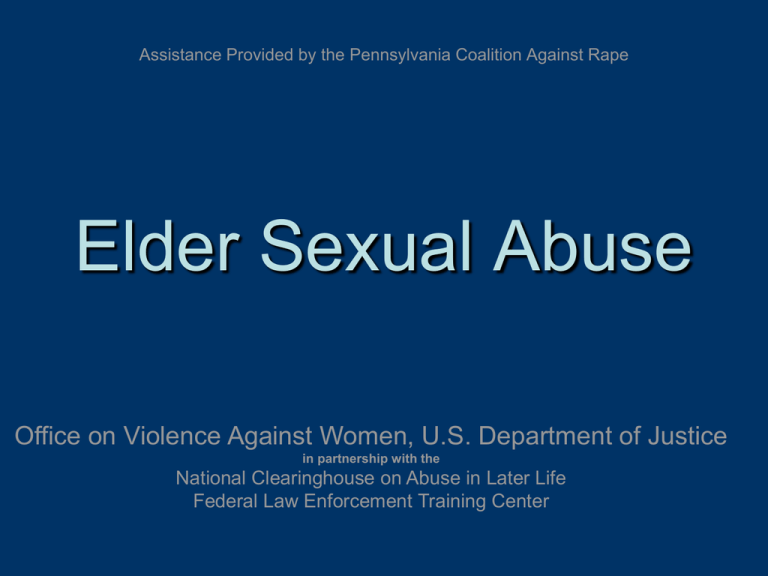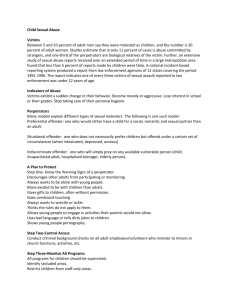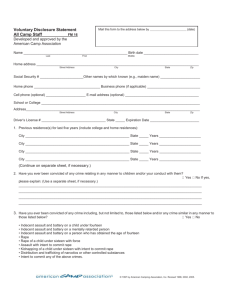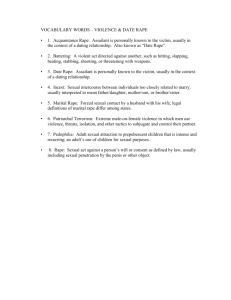
Assistance Provided by the Pennsylvania Coalition Against Rape
Elder Sexual Abuse
Office on Violence Against Women, U.S. Department of Justice
in partnership with the
National Clearinghouse on Abuse in Later Life
Federal Law Enforcement Training Center
Defined by EPS
What is it?
occurs anytime a perpetrator does anything of
a sexual nature (verbal or physical) without the
expressed consent of the victim or victims.
The continuum of sexual violence includes the
following acts or attempted acts: rape with
murder, rape, incest, child sexual abuse, ritual
abuse, non-stranger rape, statutory rape,
marital or partner rape, sexual exploitation,
unwanted sexual contact, sexual harassment,
exposure, voyeurism, stalking, trafficking and
genital mutilation.
Elder Sexual Abuse can include:
the offender forcing the victim to view
pornography or to listen to explicit sexual
accounts or comments
coerced nudity and sexually explicit
photographing
sexualized kissing and fondling
oral-genital contact/digital penetration
vaginal rape/anal rape
rape by objects/attacking victim’s genitals
with blows or weapons
How is Sexual Abuse Different for Elders?
Lack of a support system
Generational beliefs about sexual abuse
• Rigid gender roles
• Anything sexual should not be discussed
• Domestic or child sexual abuse was not
recognized
Exacerbation of existing
illnesses
Longer recovery times
How is Sexual Abuse Different for Elders?
Increased chance of sustaining serious
injury
Increased vaginal or anal tearing and
bruising that may never fully heal
Brittle pelvis or hip bones can be broken
by friction or weight
Increased risk of infections
STDs
Institutional Sexual
Violence
A more regulated
environment—
mandatory reporting
laws, protective
services, Department
of Health licensing,
ombudsman
programs
Contact with other
residents
Contact with longterm care facility staff
Domestic Sexual Violence
Limited contact with
others
Family violence
Sexual Violence Statistics
1 of every 6 American women and 1 of every 33
American men has been the victim of an attempted
or completed rape.
Once a woman is raped, she is 7 times more
likely to be raped again than a woman who was
never raped.
Nearly 7 in 10 rape and sexual assault victims
know their attacker.
Acquaintance rape and date rape are more
common than left-handedness, heart attacks or
alcoholism.
Rape and sexual assault are the least reported
violent crime.
Some Facts about Sexual Violence
Rape or attempted rape is
An act of violence not sex
An act of power not sex
Experienced by the victim as a threat to life
Both men & women who have been raped may
express that it was not rape
The victim is not to be blamed
and should be believed
Judith Herman, M.D -
“Trauma & Recovery” [1997]
“It is very tempting to take the side of the perpetrator. All the
perpetrator asks is that the bystander do nothing. He appeals
to the universal desire to see, hear and speak no evil.
The victim, on the contrary, asks the bystander to
share the burden of pain.
The victim demands action, engagement and remembering.”
Discussion Points
Older individuals can be sexually assaulted
Abusers often are family members
Most cases are underreported
Categories of Elder Sexual Abuse
Hands-on offenses (i.e., kissing, oral)
Hands-off offenses (i.e., exhibitionism,
voyeuristic acts)
Harmful genital practices (i.e., intrusive
caring for genitals)
Relevant Statutes: Sexual Battery
14:43.1. Sexual Battery
Without consent
Intentionally touching of the anus or genitals
using any instrumentality or any part of the
body of the offender or victim
Relevant Statutes: Rape
14:41 Rape – general definition
Includes oral acts
Without consent
Touching by offender or victim
14:42 Aggravated Rape
victim is 65 or older
Elder Sexual Abuse Statutes
La. R.S. 14:93.5 Sexual Battery of the Infirm
Intentional engaging . . . with non spouse
compels - physically incapable - advanced age [?] or
physical infirmity, to submit by placing - in fear – bodily
harm
incapable of resisting or understanding the nature –
stupor or abnormal mind produced by – administered by
or knows
incapacity or fails to consent, thru unsoundness of mind
- understanding the nature - knowledge
Consent
No written definition
Deemed to be without “lawful consent”
because fact specific
Unless specifically stated as in ‘incapable’ or
‘drugged’
Consent
15:1503. Abuse and Neglect of Adults
“Capacity to consent" - ability to understand
and appreciate the nature and
consequences of making decisions
concerning one's person
May be based on assessment or
investigative findings, observation, or
medical or mental health evaluations
Consent
−
Can’t be induced by force, duress or deception
−
Can’t be given by someone who is unable to make a
reasonable judgment because of youth, mental defect
or intoxication
−
No specific words to signify consent
−
Can be withdrawn at anytime
No resistance required
-
Victim doesn’t have to fight the defendant off
Prompt Complaint
−
No requirement for prompt complaint to public
authority
Determination of Incapacity
La. R. S. 28:226.
Shall be established by two physicians who
have personally examined the principal,
determined that he is incapable.
Mental Incapacity
Some victims may not have capacity to
consent to sexual activity
Spouse/partner relationships
Abuse by caregivers, including in facilities
Potential Behavioral Cues
Unexplained or sudden
changes such as:
Mood or temperament
Unusual weight loss or gain
Personal hygiene
Substance use or abuse
Sudden avoidance or fear of specific people
Sleep disturbances
Recent resistance to certain kinds of caregiving such as
bathing
Potential Behavioral Cues
Coded disclosures such as “He’s my boyfriend;” “He
loves me;” “I’m his favorite girl.”
Reacts to offender in inappropriate or romantic ways
Seems hypervigilant
Shies away from being touched
Appears afraid, embarrassed, ashamed, withdrawn
or depressed
Who are Elder Sexual Abuse Victims?
Any gender, race, ethnicity, sexual
orientation
Married/partnered or single
May have functional limitations
Who Commits Elder Sexual Abuse?
Adult family members, such as adult sons or
daughters, grandchildren, siblings
Spouses and intimate partners
Non-relative caregivers
Residents in facility settings
On-line predators
Stranger or acquaintance (least frequent)
Caregivers as Sexual Offenders
Relevant Statutes
La. R.S. 14:35.2 – Simple Battery of Infirm
La. R.S. 14:35.3 – Domestic Abuse Battery
La. R.S. 14:43.1 – Sexual Battery
La. R.S. 14:93.5 – Sexual Battery of Infirm
La. R.S. 14:42 – Sec. Degree Sex. Battery
La. R.S. 14:43.3 – Oral Sexual Battery
Sex Offenses
La. R.S. 14:41 – Rape
La. R.S. 14: 42 – Aggravated Rape
La. R.S. 14:42.1 – Forcible Rape
La. R.S. 14:43 – Simple Rape
La. R.S. 14:43.5 – Intentional Exposure to Aids
La. R.S. 14:78 – Incest
La. R.S. 14:78.1 – Aggravated Incest
Caregivers as Sexual Offenders
Relevant Statutes
La. R.S. 14:89 - Crime Against Nature
La. R.S.14:89.1 – Agg Crime Against Nature
La. R.S. 14:42 – Aggravated Rape
La. R.S. 14:93.5 – Sexual Battery of Infirm
La. R.S. 14:106 – Obscenity
La. R.S. 14: 107.2 – Hate Crimes
Why does Elder Sexual Abuse Occur?
Power and control
Mental health or dementia (inability to control
behavior)
Why Is Elder Sexual Abuse Hidden?
Government reports/academic research
lump sexual abuse into the definition of
elder abuse
Elder sexual abuse is very hard to track
because of lack of disclosure and/or
reporting
Where Does Elder Sexual Abuse Occur?
In private homes
In facilities
Considerations when Investigating Elder Sexual
Abuse
Generational (Difficulty talking about sex)
Dementia
Incest
Recovery time can be slower
Detection
Of Elder Sexual Abuse
Office on Violence Against Women, U.S. Department of Justice
in partnership with the
National Clearinghouse on Abuse in Later Life
Federal Law Enforcement Training Center
Potential Physical Signs
of Sexual Abuse
Infections, pain, or bleeding in genital areas
or mouth
Difficulty walking or sitting
Torn, stained, and/or bloody clothing
including underwear, bedding, or furnishings
Inappropriate (enmeshed) relationships
between the older adult and abuser
Potential Physical Signs
of Sexual Abuse
Bruises to outer arms, chest, mouth,
genitals, abdomen, pelvis, or inside thighs
Bite marks
Unexplained STDs or HIV
Emotional Signs of Elder Abuse
Rape Trauma Syndrome
Immediate Phase: DISORGANIZATION
Immediate Impact—
ranges from composure
to hysteria depending
on the victim's coping
mechanisms and
immediate situation
Rape Trauma Syndrome
Immediate Phase: DISORGANIZATION
Emotional reactions
Physical reactions
Social responses
Sexual disturbances
Rape Trauma Syndrome
Long Term Phase: REORGANIZATION
Psychological reactions
Physical problems
Social responses
Sexual disturbances
Post Traumatic Stress Disorder
Post Traumatic Stress Disorder (PTSD)
Fear
Anxiety
Flashbacks
Reoccurring
memories/nightmares of the
event
Difficulty in concentrating
Irritation
Isolation
Emotional numbness
Depression
The National
Women's Study
reported that
almost 1/3 of all
rape victims
develop PTSD
sometime during
their lives and
11% of rape
victims currently
suffer from the
disorder.
Factors influencing recovery include:
support systems
relationship with offender
degree of violence
type of sexual violence
perception of the abuse
Factors influencing recovery include:
social/cultural influences
previous experiences with
stress
success in coping with
previous crises
immediate contacts after
abuse
Prior Sexual Abuse
Elders who were sexually abused as children or in other
settings might experience triggers of the abuse, such as:
Major life changes like moving to a long-term care facility
Being out of control of a situation
Television and movie violence
Seeing someone who looks like assailant
Sexual advances
Reading or hearing about other sexual assaults
Action, smell or sound, that reminds elder of the assailant or the place
where assaulted
Conditions such as dementia can make an individual more
sensitive to triggers and/or bring up recessed memories.
Challenges to Identifying Elder Sexual Abuse
High likelihood of elder to hide and deny abuse
Illness/disease
Cognitive diseases
Communication deficits
Prone to bruising, falling, etc.
“An elder sexual assault victim may suddenly act fearful, withdrawn,
depressed, emotional, unwilling to participate in the routines of a
typical day, have different reactions towards certain caregivers, other
residents or family members, but these symptoms could also be
representative of other conditions like depression or dementia.”
PA nursing home staff member
Medical Treatment
Arranging for medical attention is important both to treat injury
and to collect evidence
If the assault occurred within 3-4 days, the victim should be
given a forensic rape exam.
A victim’s clothes, bed sheets and any other possible evidence (if not washed)
should be placed in a paper bag and taken to the hospital or treatment facility.
Advise the victim to not shower, wash hands, eat, drink, brush teeth, smoke
cigarettes or go to the bathroom (if necessary, save the toilet paper).
If the assault occurred after 4-5 days, a victim should be
examined and treated for injury, and evidence should be
collected.
Victims Compensation Program
… can cover …
• Forensic rape exam
• Medical expenses
• Counseling
Remember:
• Loss of earnings
Crime Victims
• Loss of support
Compensation is the
• Funeral expenses
payor of last resort
• Cash loss of benefits
• Travel expense
• Home care and child care
Working with Elder Victims
If you don’t know the individual, introduce yourself and
briefly explain your profession
Speak slowly and audibly in a kind voice
Be respectful
Establish a rapport before asking
about abuse
Allow the individual to have
control over the situation
Handling a Disclosure
Do not display alarm or disbelief
Express concern
Protect the survivor’s privacy
Validate the survivor’s feelings
Assess injuries
Arrange for medical attention
ASKING ABOUT SEXUAL ABUSE
Has anyone made you feel uncomfortable?
Is there anyone in your life who you are
afraid of?
Has anyone made you do
things you did not want to do?
Have you ever been forced to do or participate in
sexual acts you did not wish to do? Is this going on
now?
If Yes, ask for additional information. Ask questions such as,
“Are you safe?” Offer to call a sexual violence advocate
and explain any other protective services you can offer.
If No, state, “If someone does
hurt you – or you know
someone who is being hurt –
there are people who can help.
Feel free to contact me for
information, if you ever need it.”
Good Key Phrases
“I believe you.”
“I’m sorry this happened to you.”
“It is not your fault.”
“I’m glad you’re alive.”
“You did the best you could.”
“You have options.”
Reminder
Apply the same investigative strategies to
cases of elder sexual abuse
Remember to collaborate with your local
sexual assault advocate and EPS
How Louisiana Laws
Apply to
Elder Sexual Abuse
Office on Violence Against Women, U.S. Department of Justice
in partnership with the
National Clearinghouse on Abuse in Later Life
Federal Law Enforcement Training Center
Elder Abuse
Reporting
Laws
Governor’s Office of Elderly Protective Services
Distinguished from Adult Protective Services [18-59]
since it provides assistance to Louisiana residents
who are 60 years of age and older and covers all
aspects of elder abuse, including those who are at
imminent risk of:
abandonment
abuse
exploitation
neglect
EPS VERSUS APS
EPS – division of the Governor’s Office
designated to handle affairs of persons 60
and older
APS – Dept of Health & Hospitals – 18 < 60
Refer to imprecisely – e.g. La.R.S.14:35.1
Battery of Adult Protective Service Worker
Mandatory Reporting
Any PERSON who has reason to believe
that an older adult is being sexually
abused/assaulted must report to law
enforcement any/or EPS [unless facility]
No exceptions - Confidential
Statewide Elder Abuse Hotline 1-800-259-4990
Reports can be made regardless of where
the person resides
Mandatory Reporting
Elder care workers are mandated reporters as are
attorneys, doctors, nurses, ministers, accountants,
etc. [no privilege applies]—
Police are mandatory reporters to EPS but not vice
versa , except
In the case of sexual abuse/assault, serious injury,
and/or suspicious death, even EPS must report to
police
Protections for Reporters
Reporters may remain anonymous
Reporters have legal protection from
retaliation, discrimination and civil or
criminal prosecution
Safeguards for Victims
Victims have the right to be told that someone reported
that he/she might be the victim of sexual abuse and need
protective services.
Victims have the right to refuse services.
Victims have the right to legal counsel if attempt to
obtain an involuntary intervention court order.
Victims have the right to a guarantee that all information
concerning their case will be maintained as confidential.
Alleged perpetrators have the right to be notified after
substantiation of a report, and given an opportunity to
challenge the findings of the investigation.
Elder Abuse
Protective
Laws
FACILITY SEX ABUSE
EPS does NOT investigate facilities BUT
GOEA Long Term Care Ombudsman –
Toll Free: 866-632-0922
investigate and resolve complaints.
Louisiana Department of Health & Hospitals
Health Standards Section
Licensure and Certifications
Elder care workers include
employees and administrators of:
• nursing homes
• personal care homes
• domiciliary care homes
• adult day care centers/living centers
• home health care services
Abandonment of a
Care-Dependent Person
La. RS 14: 79.1 B - Criminal Abandonment
Intentional physical abandonment
of aged [>60]
by ‘caregiver’ per 14:93.3
who is compensated
Restraints
False Imprisonment – La. R.S. 14:46
‘intentional confinement’
Aggravated Kidnapping – La. R.S. 14:44 [3]
– ‘imprisoning’
Sexual
Violence
Laws
Sex Crimes - Relevant Statutes
La. R.S. 14:41 - Rape Defined
La. R.S. 14:42 – Aggravated Rape
La. R.S. 14:42.1 – Forcible Rape
La. R.S. 14:43 – Simple Rape
Caregivers as Sexual Offenders
La. R.S. 14:43.1 - Sexual Battery
La. R.S. 14:43.2 – Sec. Degree Sex. Battery
La. R.S. 14:43.3 – Oral Sexual Battery
La. R.S. 14:43.5 – Intent’l Exposure to Aids
La. R.S. 14:78 – Incest
La. R.S. 14:78.1 – Aggravated Incest
Caregivers as Sexual Offenders
Relevant Statutes
La. R.S. 14:89 - Crime Against Nature
La. R.S.14:89.1 – Agg Crime Against Nature
La. R.S. 14:42 – Aggravated Rape
La. R.S. 14:93.5 – Sexual Battery of Infirm
La. R.S. 14:106 – Obscenity
La. R.S. 14: 107.2 – Hate Crimes
Rape is committed if sexual intercourse occurs
By forcible compulsion
By threat of forcible compulsion that would prevent
resistance by a person of reasonable resolution
When the complainant is unconscious or where the person
knows that the complainant is unaware that the intercourse
is occurring
Where the person has substantially impaired the
complainant’s power to appraise or control his or her
conduct by administering or employing, without the
knowledge of complainant, drugs, intoxicants or other
means for the purpose of preventing resistance
Who suffers from a mental disability which renders the
complainant incapable of consent
Other Laws
Rape Shield Law – La. C.E. 412
Victim’s Attire – La. C.E. 412.1
Other Crimes – no evidence of ‘lustful disposition” under
La. C.E. 412.2, so only La. C.E. 404 B
Privilege – La. C.E. 504 and 505
Victim’s Rights under La. R.S. 46:1844 –
registration = notice and confidentiality [Paragraph W]
Article I, Sec. 25 La. Constitution Sex Registration – La. R.S.15:540
Confidential Communications to
Sexual Violence Counselors
Privilege
No sexual assault counselor may, without
the written consent of the victim, disclose
the victim’s confidential oral or written
communications to the counselor nor
consent to be examined in any court or
criminal proceeding.
Confidentiality for AAA Protective Services
The protective services file must be kept locked and separated from
other agency files.
Only protective services supervisors, caseworkers and clerical staff
have access to the files.
Limited disclosure of information contained in the files is permitted
only to:
a court of competent jurisdiction under court order
police, if AAA investigation results in a report to police
service providers, to initiate service delivery
The older person reported to need protective services (information
contained in the report of need only)
Department of Aging staff involved in hearing appeals or in program
monitoring
local administrators involved in program monitoring
Collaboration
To Detect, Treat
and Eliminate
Elder Sexual
Abuse
Office on Violence Against Women, U.S. Department of Justice
in partnership with the
National Clearinghouse on Abuse in Later Life
Federal Law Enforcement Training Center
The Melior Group Study on Elder Sexual Abuse
Research study conducted for PCAR on elder sexual
abuse.
Consisted of 28, 20-minute
interviews of senior staff
members across the
Commonwealth working for:
Sexual Violence Centers
Nursing Homes
Personal Care/Home Health
Care Providers
Community Service Providers
Findings
Sexual Violence Centers work with very few elders
and elder care workers work with very few
(recognized) sexual abuse victims
Sexual Violence Centers had no protocol or
programs for elder sexual abuse victims, but
acknowledged the need:
“elder victims and their families are often in denial about
the abuse; it is often difficult to help them.”
Elder care workers were aware of reporting protocol,
but did not have any procedure for addressing the
emotional needs of a sexual abuse victim
The SART Approach
A Sexual Assault Response Team (SART) is a
group of community professionals who work
jointly to minimize the trauma for sexual
abuse victims when they seek medical and
legal assistance by understanding and
complimenting each other’s roles.
La. R.S. 15:555
The traditional SART approach may not be
appropriate for elder victims because:
• Few elder victim's report sexual
abuse
• Even if abuse is reported:
–evidence may be lost
–victims or those addressing the
abuse may not know what to do
Tree of Elder Caregiving
An Elder SART:
who should collaborate
Nursing homes, personal care homes, adult day care centers, and
home health care
Sexual Violence Centers
Elder Legal Experts
Area Agencies on Aging
Health care providers and health care
facility representatives
Law enforcement
District attorney’s office
Community service providers, local religious institutions, disability services,
substance abuse programs, Meals-on-Wheels, etc.
Establishing an Elder SART
Reach out to potential members
Form a group and establish regular
meetings
Create a written plan or protocol for
addressing elder sexual abuse in your
community
Implement your plan
Evaluate your plan & address the problems
you identified
Possible Activities of an Elder SART
Implementation of Victims’
Rights
Public Awareness/Education
Community Outreach to Elder
Population
Training
Technical
Assistance/Information and
Referral Services
Public Policy Initiatives
Financial Relationships
What is Stalking?
Behavioral definition
Relevant statutes
Behavioral Definition: Stalking
Pattern of repeated, unwanted attention,
harassment, and contact directed at specific
person that would cause a reasonable
person to feel fear
Stalking
La. R. S. 14:40.2.
Intentional and repeated following or harassing.
Causes a reasonable person to feel alarmed or to
suffer emotional distress.
Uninvited presence at any place which causes
alarm or emotional distress
Result of verbal or implied threats to person or any
family member or any person with whom they are
acquainted
Cyberstalking
La. R. S. 14:40.3.
Action of any person to accomplish:
Use in electronic . . . threatening to inflict
bodily
harm or physical injury to property or for purpose of
extorting property
Electronically communicate . . . to another repeatedly
Knowingly make false statement concerning
Knowingly permit electronic communication device to
be used
Stalking Facts: Later Life
Older adults are almost as likely to be
stalked as younger individuals
Often, stalker is someone who the older
adult victim knows
Stalking in later life is often part of domestic
violence
Considerations when Investigating
Stalking Cases
Victims may not be believed (Dementia,
disability of stalker)
Use of logs or journals may increase victim’s
credibility
Older adults may not recognize they are
victims of stalking
Final Thoughts
Older individuals can be sexually assaulted
Abusers often are family members
Most cases are underreported
Older adults are almost as likely to be
stalked as younger individuals







